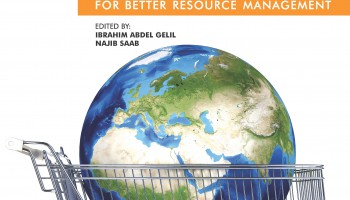
Download this report here
Beirut, 11/01/2015
Annual reports on the state of the Arab environment, produced since 2008 by the Arab Forum for Environment and Development (AFED), have become a main source of information and a prime driver for policy reforms in Arab countries. Findings of the seven reports produced so far have clearly underscored the pivotal role of sustainable consumption patterns in any viable environmental management scheme. The Energy-Water-Food Nexus proved specifically significant, especially with the growing impact of climate change.
Increasing production alone cannot solve the need of food for hungry people and water for thirsty people, nor will it provide power to dark villages. Equally, solely building more waste dumps and incinerators cannot solve the trash crisis.
Inadequate consumption patterns are at the core of the problem, and any feasible solution requires a fundamental change in the way we consume resources and produce waste. Thus, the 2015 AFED Annual Report, Sustainable Consumption for Better Resource Management, discusses how changing consumption patterns can help preserve resources and protect the environment, ultimately leading to sustainable development.
While it is true that changing consumption patterns requires adequate policies based on expert studies, the support of consumers is a prerequisite for successful implementation. In view of tracking how people perceive consumption and to what extent they are ready for positive change, AFED carried out a wide-ranging public opinion survey, which drew over 31,000 participants from 22 countries. The survey, which has been incorporated in the report, found that the Arab public is ready to pay more for energy and water and to change their consumption patterns if this will help preserve resources and protect the environment.
AFED hopes that its report on sustainable consumption will help Arab countries adopt the appropriate policies to promote better management of natural resources, and to encourage the public to change their consumption habits to enhance efficiency and reduce waste.